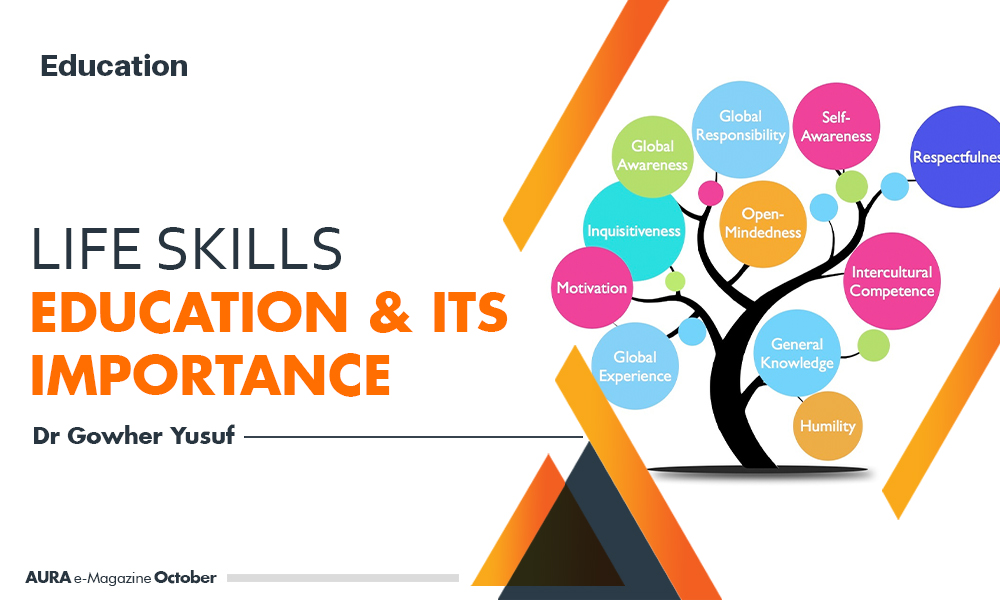Paediatrician, Life Skill Coach, Parent Coach, Paediatric Obesity management specialist, Child development practitioner, NLP Practitioner, Published Poet & Author.
In a world where various challenges and overwhelming circumstances surround our children and young adults, are they well-dressed with an armour of skills that will protect them and make it easier for them to deal with the daily demands of life? As parents, caregivers, educators, and society at large, we should ask this question.
We should include life skills education not just in schools and colleges but also as a part of the day-to-day training of our children at home. Life skills are a set of abilities that enable us to deal effectively with the demands and challenges of life. They also can be called ‘psychosocial skills’, as they are psychological and include thinking and behavioural processes. Others define life skills as behavioural, cognitive or interpersonal skills that enable individuals to succeed in various areas of life (Hodge, Danish, & Martin, 2013). Life skills are a group of psychosocial competencies and interpersonal skills that help people make decisions, build healthy relationships, solve problems, communicate effectively and think critically and creatively.
Life skills can help develop the personality of children and young adults by developing a positive attitude towards life and enabling them to deal with the demands of day-to-day living. Skills like self-awareness, self-confidence, communication skills, and stress management,- to name a few, can be instrumental in positively impacting the personality of our young minds. Much research has suggested the importance of life skills in individuals’ overall health and physical and mental well-being. We live a happier and healthier life by learning how to regulate emotions effectively and by developing enduring, supportive relationships. Research also suggests that developing life skills may help reduce drug, alcohol, and tobacco use. It may also reduce aggression and violence (Botvin & Griffin, 2004).
Life Skills Education is crucial for students’ overall development. It can be useful as it not only addresses children’s needs but also helps motivate them. It also provides practical, mental, emotional, social, and self-management skills for life changes.
Examples of Life Skills
According to several organisations (UNICEF, UNESCO, WHO), the following are the basic life skills (Prajapati, Sharma, & Sharma, 2017):
• Self-awareness
• Critical thinking
• Creative thinking
• Decision making
• Problem Solving
• Effective communication skills
• Interpersonal relationships
• Empathy
• Coping with stress and emotions
Other Important Life Skills Include:
• Setting goals
• Having a positive mindset
• Self-worth
• Self-actualization
• Self-confidence
• Having good habits
• Taking effective action
• Setting the right priorities
• Self-soothing
• Optimism
• Acceptance (non-judgement) of others
• Ability to let go of the past
• Self Awareness
• Knowing your core values
• Achieving flow
• Being self-determined
• Being compassionate
• Self-motivation
• Practicing self-disclosure
• Emotional intelligence
• Being self-compassionate
• Managing emotions
• Loving yourself

Tips for Including Life Skills in Educational Institutions and Homes
Classroom Discussions are an amazing activity for students to learn and work together to solve problems. They further empower students to develop their understanding of the topic and personalise their connection. They also create skills in listening, decisiveness, and empathy.
Brainstorming helps students generate ideas rapidly and spontaneously. It assists students in using their imagination and encourages them to think outside the box. It is a great discussion starter because the class can imaginatively create ideas.
Role Plays are not only fun because they involve the entire class; they encourage students to be active and participative. They also provide a strategy for practising skills, experiencing how one could handle a likely situation in real life, increasing empathy and understanding other people’s points of view, and growing insight into one’s feelings.
Groups are useful when time is of the essence as they boost student input. They permit student interactions and help them get to know one another better, which helps in team building and learning cooperation.
Educational Games and Simulations advance fun, active learning, and rich discussion as students work hard to make statements or procure points.
At home, parents and caregivers can, too, impart life skills education to children and young adults through role-play, storytelling, games, and fun activities.
Role modeling
Model positive behaviours and demonstrate effective communication and problem-solving in daily interactions with your children.
Encourage Independence
Allow your child to take on age-appropriate tasks and responsibilities.
Provide Opportunities for Decision-Making
Involve your child in decision-making processes whenever possible. For instance, let them choose the menu for weekend meals or select their clothes for the day.
Promote Effective Communication
Create a supportive environment where open communication is encouraged. Hold regular family meetings to teach listening skills, respect for others’ opinions, and appropriate ways to express feelings and thoughts.
Teach Time Management
Help your child learn to manage their time effectively by using tools like calendars or digital apps to plan their daily activities and responsibilities.
Develop Problem-Solving Skills
Present hypothetical problems or engage in brain-teaser games that challenge them to think critically and creatively.
Encourage Emotional Awareness
Teach your child to recognise and name their emotions, understanding the causes and effects of their feelings.
Build Social Skills
Arrange playdates, encourage participation in team sports or group activities and model social interactions.
Inspire Creativity and Curiosity
Provide diverse experiences that increase curiosity and creativity, such as arts and crafts, science projects or cultural outings.
In Conclusion
Life skills education cannot be emphasised enough in today’s society. Yadav P and Iqbal N (2009) showed positive after-effects of imparting life skills education to students and bringing change in young adults’ mentality, thought and conduct by providing a supportive environment. According to Errecart et al. (1991) and Caplan et al. (1992), life skills education is a successful methodology in essential prevention education, as it is more interactive, utilises a problem problem-solving approach and is exercise-based.


0 Comments